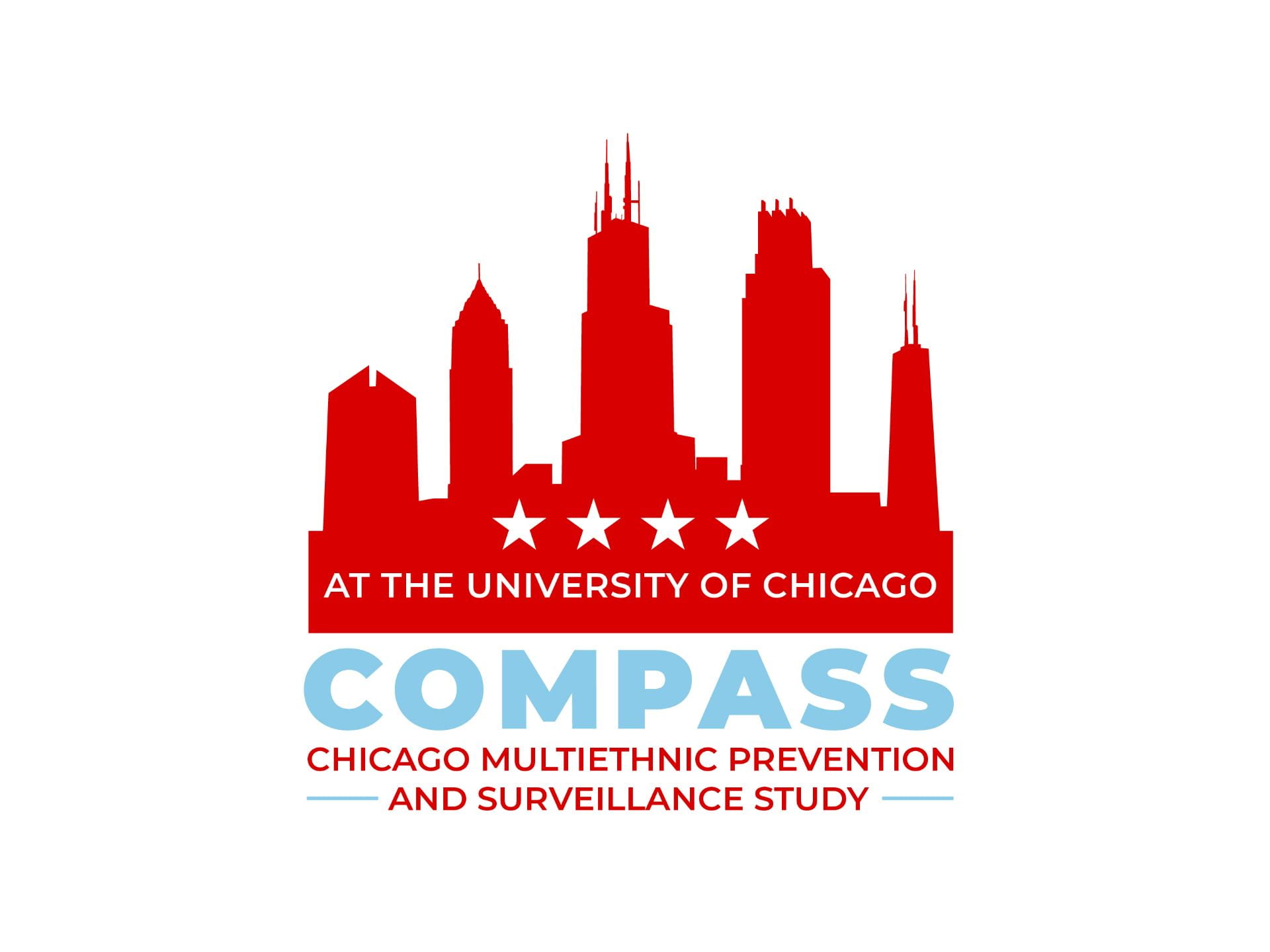What can I expect?
The Chicago Multiethnic Prevention And Surveillance Study (COMPASS) is a long-term research program that examines the impact of factors such as lifestyle, healthcare access, the environment, and genetics on the health of Chicago residents.
When you participate in COMPASS, you will join a group of over 6,000 Chicagoans who are sharing their health data in order to help researchers at the University of Chicago better understand the health of our city’s citizens.

What data is collected?
Survey data
Participants are asked to provide information on their background, health history, environment, and lifestyle by completing an online survey.
This survey should take between 20 and 45 minutes from start to finish. It can be completed at our University of Chicago Medical Center research clinic, or at one of our community outreach events.
Biospecimens
Our trained program staff members collect a blood sample (about 4 tablespoons), a urine sample, and a saliva sample from all COMPASS participants. These samples are collected at the UChicago research clinic or at a mobile research unit event, and are analyzed using a series of tests in order to learn about participants’ genetic background, environmental exposures, and overall health.
Participants are encouraged to provide an optional stool sample using a simple take-home kit that can be returned to our laboratory in a pre-paid mailer. The stool sample is analyzed to learn about the participant’s gut microbiome and the important relationship between cells and microorganisms in the human body. Program staff will provide participants with the stool sample collection kit, as well as instructions for collecting the sample and mailing it back to our laboratory.
Physical measurements
Program staff collect each participant’s height, weight, and waist circumference, as well as their blood pressure and pulse.
Air quality measurements
To explore the connections between air quality and health, participants are asked to allow COMPASS to collect air quality measurements from inside their homes. Our air quality devices resemble small boxes that plug into a wall outlet. Some devices connect to participants’ home wi-fi network, while others do not.
Our program staff drop off the air quality devices at participants’ homes, the participant sets up the device (it’s easy!), and our staff return after 3 to 5 days to retrieve the device.
The participant is also asked to complete a short indoor air quality survey. This can be done by the participant alone, or with the assistance of our research staff.
Electronic Health Record (EHR) data
In order to see how participants’ health changes over time, the COMPASS consent form asks permission to collect health data from electronic health records.
Data from other IPPH research initiatives
Participants who are enrolled in more than one IPPH research program are encouraged to consent to share their COMPASS data with the other programs in which they are enrolled. Sharing data across our research initiatives allows the IPPH to pool its resources and develop richer data sets.

How does it work?
Scheduling (5 minutes)
To book an appointment, you have three options:
- Call us at (773) 795-4767
- Email us at compassinfo@uchicago.edu
- Visit the events page to learn where our mobile research units will be and visit without an appointment.
Consent (10 to 20 minutes)
When you arrive for your appointment or at a recruitment event, you will be asked to complete the online COMPASS consent form. This consent process ensures that you understand the reasons for this research and what it means to participate in the study.
Our program staff members will provide you with computer access and will answer any questions you may have throughout the consent process.
Survey (20 to 45 minutes)
After completing the consent process and enrolling in COMPASS, the next step is to complete the online survey. Staff members will provide you with an iPad to complete this survey, or it can be completed on your mobile phone.
Biospecimen and physical measurement collection (40 minutes)
After completing the consent process and online survey, our research staff will collect your height, weight, blood pressure, heart rate, and hip & waist circumference.
COMPASS staff also collect blood, urine, and saliva samples.
Before your scheduled visit, be sure to have something to eat, drink plenty of water, and take any medications as usual. There is no need to fast before your appointment.
Follow-up data collection
Our staff will give you a stool sample collection kit to take home and return by mail, and will help you to schedule an appointment for the air quality monitoring device to be dropped off at your home.

Do I get anything for participating?
New COMPASS participants are eligible to receive $75 for full participation
Participants receive a $50 Visa gift card for completing the consent process, finishing the online survey, and having their biospecimens & physical measurements collected.
Participants receive a $50 Visa gift card for completing the COMPASS consent process, online survey, contributing biospecimens, and having their physical measurements collected
Participants receive a $25 Visa gift card for setting up their home air quality device, collecting 3 to 5 days of data, completing an online home air quality survey (this can be done with staff assistance), and arranging the successful return of the air quality monitoring device.
Participants receive a $25 Visa gift card for setting up their air quality monitoring device, collecting 3 to 5 days of data, completing an online air quality survey (this can be with staff assistance), and scheduling the successful pick up of their air quality monitoring device.
After one year, COMPASS participants are eligible to complete an updated consent form, complete an online follow up survey, and contribute a new set of biospecimens and physical measurements. They will receive a $25 Visa gift card as a thank-you.
Your content goes here. Edit or remove this text inline or in the module Content settings. You can also style every aspect of this content in the module Design settings and even apply custom CSS to this text in the module Advanced settings.
